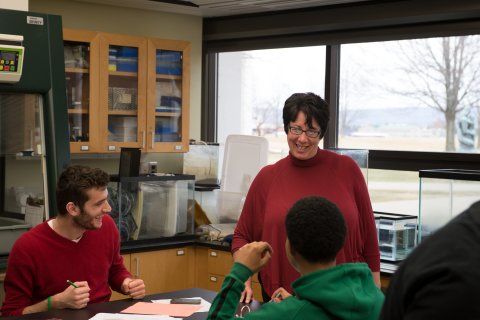Terri L. Provost, Ph.D.

Jump To
Biography
My name is Terri Provost. I am an assistant professor at Utica College. In 1994 I received my BS in food and nutrition from Bowling Green State University, Bowling Green, OH. Research for my MS degree focused on the effect of maternal exposure to polychlorinated biphenyl (PCB) on growth, growth related hormones, and liver function in 15- and 30-day-old rat pups. The training I received for the MS degree included a 1200 hr American Dietetic Association approved internship for registration eligibility and a concentration in biological sciences. Although nutrition remains a focus in my research and teaching, endocrinology is the primary focus of my research. My Ph.D. from Bowling Green State University is in biological sciences with a specialized interest in endocrinology. The topic of my dissertation was the effect of dietary PCB exposure during gestation and lactation on endocrine function, neurochemical status, and learning in Sprague-Dawley rat (Rattus norvegicus) offspring.
Since the Mohawk Valley has been home to many industrial corporations environmental contamination is a concern. The neighboring Hudson River Valley has been the focus of a major PCB clean up effort because of contamination of wildlife and humans. During the years of active contamination (from the early 1920s through 1977) PCB was dumped without regulation. Because of chemical and thermal stability the contamination of wildlife and humans continues. Since PCB has been identified as an environmental endocrine disrupter the study of area wildlife in the Mohawk Valley is of interest to this investigator. Therefore, my research will continue to focus on the effects of environmental contaminants on endocrine function and inflammatory response in offspring exposed to toxins in utero and during lactation using rodents as a model. This investigation will include laboratory study of rodents as well as analysis of contamination in the field. A newly evolving area of interest involves the effects of malnutrition (lipids and micronutrients) as an added variable to contaminant ingestion throughout the life cycle. Students interested in conducting research in the laboratory or in the field are welcome to explore the research possibilities in this lab.
Education
B.S., M.S., Ph.D. - Bowling Green State University
Research
Provost, T. L., Juárez de Ku, L. M., Zender, C, and Meserve, L. A. 1999. Dose- and age-dependent alterations in choline acetyltransferase (ChAT) activity, learning and memory, and thyroid hormones in 15- and 30-dayold rats exposed to 1.25 or 12.5 ppm polychlorinated biphenyl (PCB) beginning at conception. Prog. Neuro-Psychopharmacol. & Biol. Psychiat. 23:915-928.
Courses Taught
BIO 102 - Human Anatomy and Physiology II
A continuation of the study of man as begun in Biology 101. Included are: endocrinology; the biology of reproduction; the circulatory, respiratory, and digestive systems; and the interaction of cultural and biological evolution.
BIO 205 - Human Nutrition
Study of dietary factors required for human growth and health, underlying bases of these requirements, and specific components available to meet these needs.
BIO 322 - Developmental Biology
The principles of growth and development of plants and animals; analysis and formation of organ systems. The laboratory involves a descriptive and experimental study of the general principles of development in plants and animals.
BIO 362 - Endocrinology
Advanced study of the functional interrelationships of the endocrine system withing biological organisms. Emphasis on the endocrine system's response to external and internal stimuli in maintaining homeostasis. Phylogeny of hormones and clinical dysfunction.
I would like to see logins and resources for:
For a general list of frequently used logins, you can also visit our logins page.
